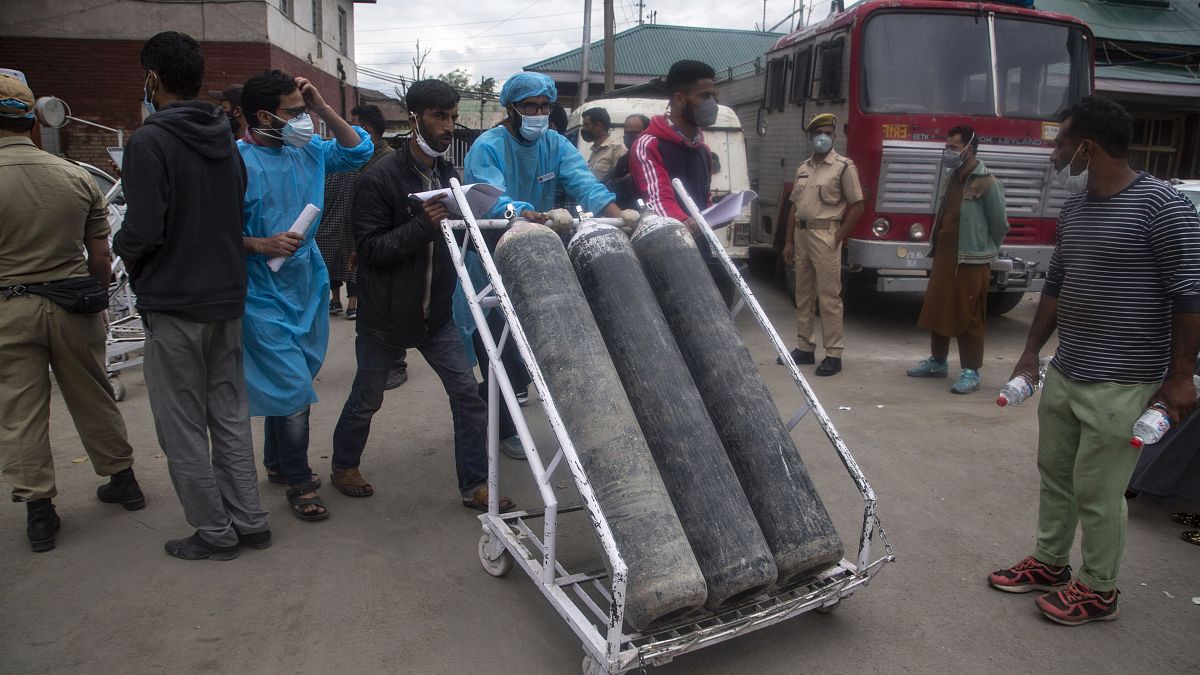The B.1.617 variant was first detected in India in October 2020 and has multiple concerning mutations that affect how it binds to proteins. It is thought to spread more rapidly than other COVID-19 strains.
A new COVID variant that first emerged in India has brought further travel restrictions and concern as it spreads in several countries.
The B.1.617 variant, with three sub-lineages, was first detected in India in October 2020 and has multiple concerning mutations that affect how it binds to proteins.
Now, as it spreads in the UK, some countries are considering stricter measures for British travellers, with Germany curbing non-essential travel from the country.
The World Health Organization (WHO) named B.1.617 a variant of concern in May, meaning it either spreads more rapidly, causes more severe disease or decreases the effectiveness of vaccines or treatments.
It is thought to be one of the factors responsible for the devastating COVID-19 outbreak in India, where hospitals have been overflowing as they report global records of daily cases and deaths.
At the peak of India's devastating outbreak in May, the country was reporting as many as 400,000 daily COVID-19 cases and continues to count roughly 4,000 daily deaths.
Why is the variant that emerged in India concerning?
The B.1.617 lineage has multiple mutations that are thought to make it more transmissible.
The UK's Scientific Advisory Group for Emergencies wrote said this month that it is likely the variant is more transmissible than the B.1.1.7 variant that first emerged in the United Kingdom, adding that "it is a realistic possibility that it is as much as 50% more transmissible", according to the group's meeting minutes.
Dr Eleanor Gaunt at the University of Edinburgh says that several mutations in the spike protein, which is what the virus uses to enter into cells, are important.
One mutation, the L452R, is a change in the protein "associated with enhancing the ability of the SARS-CoV-2 spike protein to bind to host cell surface ACE2" found on the surface of cells, she said.
The sub-lineage "B.1.617.2 has spread more rapidly than its two close relatives, and so it is of particular interest as to what mutations are exclusive to this lineage.
"In the spike protein, a deletion of two amino acids (157-158) has previously been linked to antibody escape," Dr Gaunt added, meaning it might influence how the variant responds to treatments or vaccines.
In other sub-lineages of the B.1.617 variant, there is an amino acid change also thought to allow the virus to enter cells more easily. That type of mutation has been associated with increased transmission in other variants such as the P1 variant that is circulating in Brazil.
The WHO's technical lead for COVID-19, Dr Maria Van Kerkhove, said in April that "having two of these mutations which have been seen in other variants around the world are concerning" due to possible "increased transmissibility" and "reduced neutralisation which may have an impact on our countermeasures including the vaccines".
More travel restrictions could be implemented
Many countries have already restricted travel from India where the variant is spreading significantly, with the European Commission urging EU member states just two weeks ago to further limit travel from India.
"It is important to limit to the strict minimum the categories of travellers that can travel from India for essential reasons and to subject those who may still travel from India to strict testing and quarantine arrangements," the Commission said in a statement.
But the variant has already been detected in more than 50 countries, according to the WHO's weekly epidemiological update.
Despite low case numbers, the UK has reported significant percentage increases in the B.1.617.2 variant in recent weeks, counting a total of 3,424 cases of that variant.
"The emergence of this variant in the UK has coincided with the easing of restrictions such as people being allowed to travel across the country, to attend hospitality venues inside, and the removal of the requirement for children to wear masks in schools," said Dr Gaunt, who is the Sir Henry Dale Fellow at The University of Edinburgh's Roslin Institute.
There have been some hotspots detected and experts are concerned that the UK will experience a third epidemic wave.
France is mulling restrictions from the UK over a rise in cases of this variant, with foreign affairs minister Jean-Yves Le Drian stating on Sunday that British tourists could face tougher restrictions.
Germany has curbed most travel from the UK allowing only travel for German citizens, residents or their spouse/partner/child under 18 or for urgent humanitarian reasons.
Will vaccines work against the B.1.617 variant?
A recent UK study found that the Pfizer/BioNTech COVID-19 vaccine was 88% effective against the variant two weeks after the second dose. Two doses of the AstraZeneca vaccine were 66% effective against the B.1.617 variant.
Yet both vaccines were only 33% effective against symptomatic COVID-19 from B.1.617.2, three weeks after the first dose compared to around 50% against the B.1.1.7 variant that first emerged in the UK.
The UK government has thus encouraged people to get their second vaccine doses.
"The very limited protection offered by a single vaccine dose against the B.1.617.2 variant is of concern and underpins the decision to bring second doses forward" in the UK, DrGaunt said.
It is also critical, experts say, that vaccination continues while there are low levels of virus circulating so that new variants do not emerge that subvert vaccines.
"The higher the levels of virus in the population, the more likely it is that a vaccine-evasive variant will emerge," said Dr Gaunt.
"Vaccine manufacturers are developing vaccines targeting viral variants, and so if this happens this will reflect a setback rather than being something that we are powerless against."
